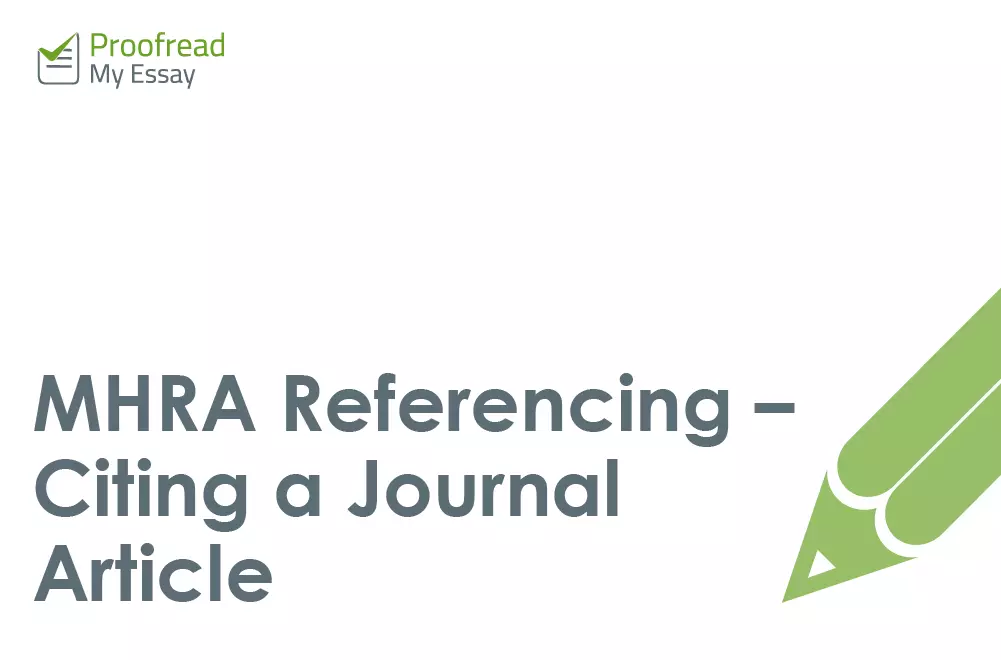Since ‘MHRA’ stands for ‘Modern Humanities Research Association’, it won’t surprise you to learn that MHRA style is commonly used in the humanities. And if you’re studying in this area, knowing how to use MHRA referencing to cite a journal article is wise. Luckily, that’s what we’re going to explain in this post!
Citing a Journal Article in MHRA Referencing
When citing a journal article in an essay, footnotes should be indicated using superscript numbers:
Like this, for example.1
In the accompanying footnote, the format to use for a journal article is:
n. Author(s), ‘Article Title’, Journal, volume (year), page range (page number).
‘Page range’ here refers to the complete range of pages for the article, while ‘page number’ refers to the specific page(s) being cited. Only the latter is preceded by ‘p.’ For example:
1. Joan M. Herbers, ‘Time Resources and Laziness in Animals’, Oecologia, 49 (1981), 252–62 (p. 260).
If citing an online article which differs from the print version or that is only available electronically, a URL/DOI and date of access should be given instead of a page range:
2. Laverne Jones, Stuart Cox, and Polly W. Brecon, ‘Sleepy Town: Why Are You Always Tired?’, Somnambulant Studies, 6 (2008), <https://www.jstor.org/stable/3058956> [accessed 12 March 2017] (p. 129).
However, if an online article is available in the same form in print, you can simply cite it in the same way you would the print version.
Repeat Citations
If citing the same article more than once, you can give a short citation in subsequent footnotes. Use ‘ibid.’ for consecutive citations or the author’s surname for non-consecutive citations (plus a title if citing more than one source by the same author):
Find this useful?
Subscribe to our newsletter and get writing tips from our editors straight to your inbox.
1. Joan M. Herbers, ‘Time Resources and Laziness in Animals’, Oecologia, 49 (1981), 252-62 (p.260).
2. Ibid., p. 258.
3. Joan M. Herbers, ‘On Caste Ratios in Ant Colonies: Population Responses to Changing Environments’, Evolution, 34 (1980), 575-85 (pp. 576-7).
4. Herbers, ‘Time Resources and Laziness in Animals’, p. 262.
Add Journal Articles to an MHRA Bibliography
When listing sources in your bibliography, the format to use for a print journal article is:
Surname, First Name, ‘Article Title’, Journal, volume (year), page range
This is similar to the first footnote, but with the first listed author’s names reversed and no full stop. With online articles, the URL/DOI and a date of access are given instead of a page range:
Surname, First Name, ‘Article Title’, Journal, volume (year), <URL/DOI> [date of access]
In practice, this would look something like the following:
Herbers, Joan M., ‘Time Resources and Laziness in Animals’, Oecologia, 49 (1981), 252–62
Jones, Laverne, Stuart Cox, and Polly W. Brecon, ‘Sleepy Town: Why Are You Always Tired?’, Somnambulant Studies, 6 (2008), <https://www.jstor.org/stable/3058956> [accessed 12 March 2017]
As with footnotes, though, if online articles are also available in print, you can usually cite them in the same way you would a print article (check your style guide if you’re unsure about this).

(Photo: Shingo_Nono)



